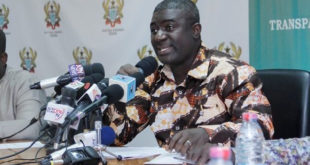The second installment of the $3 billion International Monetary Fund (IMF) financing will be given to the government once all structural reform requirements have been completed.
The benchmarks, also known as conditionalities, call for the creation of a thorough inventory of the payment arrears accumulated by all ministries, departments, and agencies (MDAs), the development of a plan to strengthen financial institutions and the financial sector, and the release of an updated recovery strategy for the energy sector.
The second tranche of an additional $600 million will be released upon achievement of the benchmarks and is anticipated to arrive in the Bank of Ghana’s (BoG) accounts in November of this year.
This was revealed in Accra on Wednesday at a technical briefing on the Mid-Year Budget Review with the media and other stakeholders.
According to a director at the Ministry of Finance (MoF), when the second tranche arrives, the three-year extended credit facility (ECF) will total $1.2 billion.
“We have finalised a comprehensive stock-taking of payables accumulated by all MDAs, designed a payable clearance plan and laid out a structural reform plan to reduce future accumulation of arrears.
“We have also completed a strategy to strengthen the financial sector and rebuild financial institutions’ buffers, in collaboration with the Fund staff,” the director added.
As part of the $3 billion IMF-supported post COVID-19 Programme for Economic Growth (PC-PEG), which was agreed by the IMF Executive Board on May 17, this year, the Bank of Ghana (BoG) received the initial instalment of the ECF, totaling $600 million.
By implementing extensive and forceful structural changes, it aims to rebuild macroeconomic stability and debt sustainability, develop resilience, set the groundwork for greater and more inclusive growth, and safeguard the weak and disadvantaged.
The Ministry of Finance has implemented a comprehensive outreach/sensitization effort to engage all important stakeholders in order to ensure the effective implementation of the IMF programme and, consequently, the mid-year budget.
Six thematic groups also provide weekly monitoring around various broad areas, such as on public finance management, macro fiscal, state-owned enterprises (SOEs) performance (including energy and COCOBOD), tax policy and administration, financial sector stability, growth and social protection, while monthly monitoring of the program is spearheaded by the Cabinet and Economic Management Team (EMT).
The director also mentioned that the end of June and the end of December will serve as the test dates for two annual evaluations of the IMF program.
This will evaluate if the benchmarks for structural performance, indicative targets, and quantitative performance requirements that were set for 2023 have been met.
The first review is slated for September 2023, and the Board may approve it as early as November of this year.
The second tranche of $600 million will be released right away if the review is satisfactory.
Source: Ghanatodayonline.com
 Ghanatodayonline.com News, Politics, Health, Education & More
Ghanatodayonline.com News, Politics, Health, Education & More



